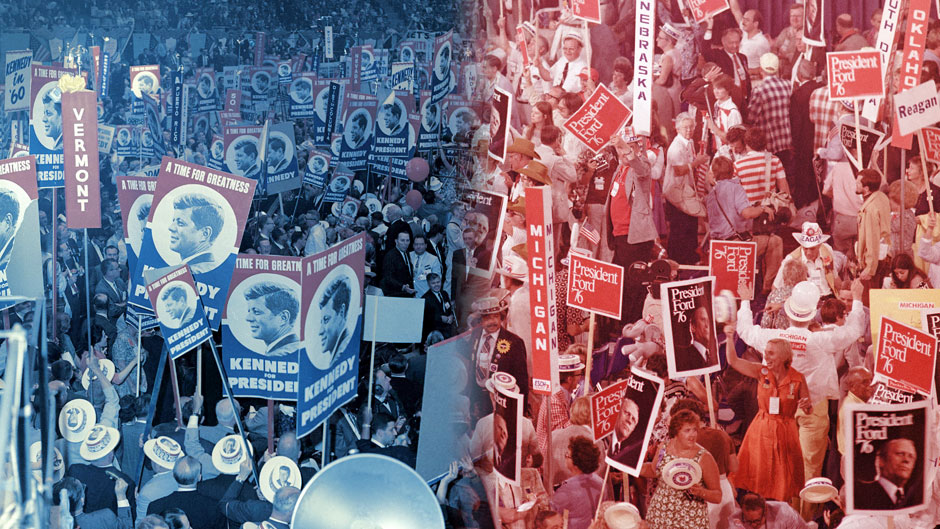Political conventions in modern times have become each party’s major celebration to not only have delegates network with each other and make new contacts but to ultimately—with a lot of fanfare and thousands of balloons—nominate its candidate for president.
This year it will be different. Like everything else, the coronavirus has put an end to the traditional political celebration.
The Democratic National Convention, which originally would have drawn 50,000 people to Milwaukee, will now begin on Aug. 17 in a smaller venue in the same city. The speeches, meetings, and events will be conducted virtually. Plans for a smaller in-person crowd recently was scrapped.
The Republican National Convention, which was originally scheduled to take place in Charlotte, North Carolina, and then switched to Jacksonville, was cancelled because of concerns surrounding the spread of the virus. The party is still considering a severely reduced convention to be held in Charlotte beginning on Aug. 24.
Gregory Koger, professor of political science at the University of Miami, and Samuel Terilli, associate professor in the School of Communication, responded to questions about the history and significance of political conventions.
How did political conventions begin?
The very first conventions were in the early 19th century. Prior to that time, when parties wanted to nominate presidents, the members of Congress would have a meeting and would nominate the candidates. That meant that you would not be able to participate in electing the president unless you were already an elected member of Congress. It was a very elitist system.
The first presidential convention was held in 1831 by the Anti-Masonic Party, a group that did not like Masons and felt that they were an elite group that were corrupt.
Then in 1832, the Jacksonian Democratic Party held a convention as well. It was similar to what we have now. Delegates and party members from each state got together and voted on presidential nominees and then adopted a party platform or statement of principles.
—Gregory Koger
What is the main function of a Democratic or a Republican convention?
It has several functions. One is that it can be for party management, deciding what the party rules will be going forward. Second, the parties usually adopt a formal platform to make a public appeal to voters. These platforms may express a general ideology of governance or promote the historical legacy of the party, but in modern times they are statements of policy on a wide range of topics. Even if voters do not read these party platforms, the process of developing a party platform serves the function of the participants finding a common ground within the party.
This year, for the first time since the 1830s, the Republicans do not have a new platform. In theory, the message is that the party is standing for the same policies it advocated before Donald Trump was nominated in 2016. There is nothing in the Republican platform about building a wall on the southern border, imposing retaliatory trade sanctions, or responding to the COVID-19 pandemic. I would expect the party platform to reflect what the party is actually doing. Presumably, the Republican party has eschewed the process of adopting a party platform because there are immense policy differences within the party coalition. So, it is more difficult to agree on a set of policies than to campaign without them. Alternatively, the Republicans may have a policy agenda, but they do not wish to put it in writing and share it with the public.
—Gregory Koger
This year there will be no packed auditoriums, no balloons, no celebratory parties. How will this affect the political process?
The last informal function of a convention is networking. People getting together and donating money to the party and its candidates and building connections across state lines. It is a wonderful time for members of the party to get to know each other.
Those who hope to be future political candidates go to raise their national profile. It was at the 2004 Democratic convention that most Americans first saw Barack Obama.
This year’s virtual conventions and the reduction of participants obviously make this networking very difficult. That is the biggest loss.
—Gregory Koger
President Trump is still working out how the virtual presentations will take place, but can speeches done virtually have the same effect as live ones from the floor of a convention?
Both candidates will make a speech and broadcast that speech, and there will be some crowd noise in the background.
—Gregory Koger
As of this date the Republicans may ban the press from their convention. Will it have a major effect on the outcome or in public perception?
Political conventions have become a waste of time. Little news happens. The parties and candidates rarely do anything substantive. They have turned the conventions into extended political advertisements aimed at the faithful. For every worthwhile speech, there are hours of boredom, balloons, and pablum. If the press has any role in contemporary conventions, that role is to provide context and fact-checking, not to be cheerleaders.
The fact that the Republicans have bothered to ban the press says more about Republican fear of an independent press than anything else. Any form of rigorous, factual reporting seems to cause a panic attack in that party and in the Trump White House in particular. Their convention will just be one long, irrelevant political advertisement streamed to anyone bored or paid enough to watch.
—Samuel Terilli

